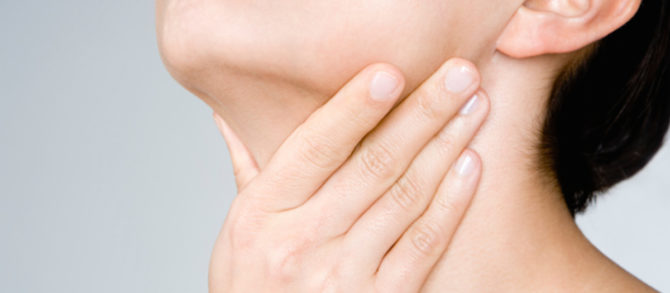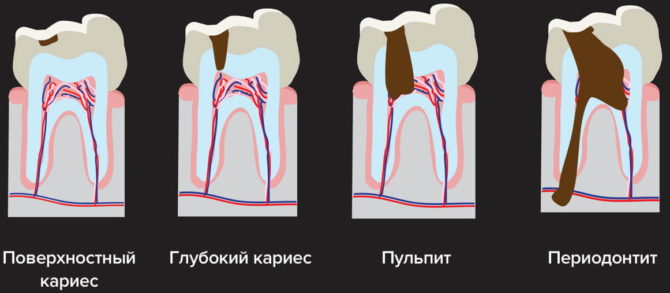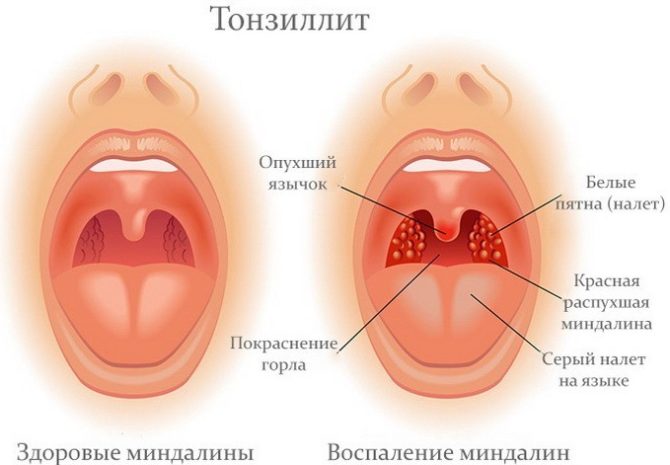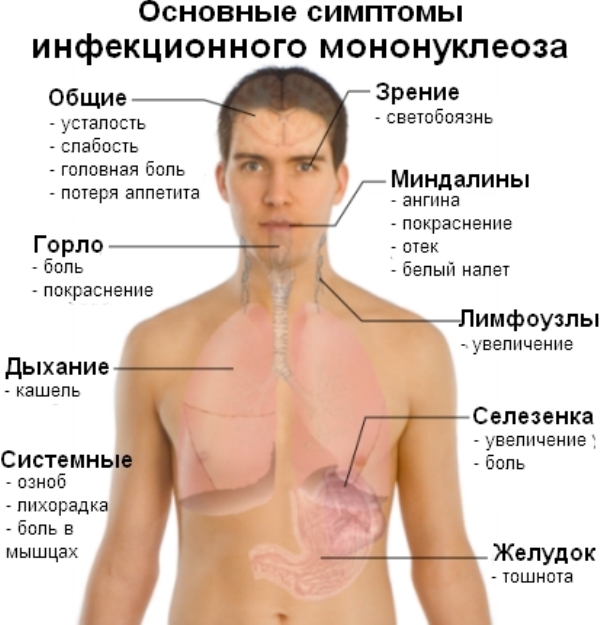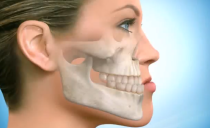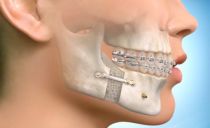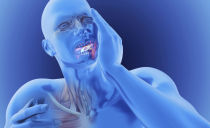For what reasons the chin or neck under the jaw in the larynx can hurt
There are many reasons why the chin hurts. They can be both quite harmless and fatal, so you can not let this symptom drift. It is necessary to consult a doctor and follow his recommendations.
Content
Why there is pain in the lower jaw and chin
Pain under the lower jaw on the right or left when pressed and at rest can indicate a number of serious diseases. If this symptom occurs, you should consult a doctor and conduct a hardware diagnosis to identify the exact cause of the discomfort.
Oral diseases
Pain in the chin often indicates the development of dental pathologies:
- pulpitis;
- periodontitis;
- deep caries;
- sialolithiasis - salivary stone disease.
I.e a feeling of discomfort in the chin area most often occurs due to the formation of a purulent focus in the oral cavity.
Chin bruise
Often pain under the lower jaw is the main symptom of a bruise. The intensity of the discomfort depends on the nature of the injury and its location. Moreover, soreness can appear even some time after a mechanical impact.
With bruising, only the soft tissues of the chin are damaged. As a result, a hematoma, edema appears in this area, but the bone remains intact. If the lower jaw hurts very badly, an X-ray is recommended to rule out more serious damage.
Jaw fracture
A fracture of the lower jaw can occur due to any injury: bruise, shock, fall from a height. The integrity of the jawbone will be compromised, and its long-term restoration will be required.
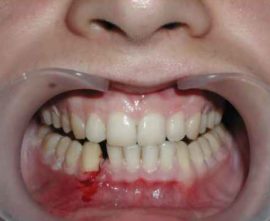 A jaw fracture can be diagnosed visually, because, in addition to pain in the chin, it is characterized by the presence of additional symptoms:
A jaw fracture can be diagnosed visually, because, in addition to pain in the chin, it is characterized by the presence of additional symptoms:
- soft tissue swelling;
- hemorrhage;
- hematoma;
- violation of chewing function;
- sore throat when swallowing.
With a fracture of the lower jaw, when pressed, it hurts not only the injured area, but also the soft tissues of the neck. With a fracture of the upper jaw, the pain spreads to the upper part of the face.
Jaw osteomyelitis
Osteomyelitis is a dangerous infectious lesion of the jawbone. The main types of osteomyelitis:
- odontogenic, arising from the multiplication of pathogenic microflora in the dental canals and at the roots of the teeth;
- acute, accompanied by severe symptoms of intoxication, pronounced pain and fever;
- traumatic, developing as a result of traumatic effects on the bone.
Temporomandibular joint dysfunction
With dysfunction of the temporomandibular joint, the pain gives off to different parts of the jaw, so unpleasant sensations can occur not only in the chin, but also in the forehead or nose. With this disease, it is difficult for the patient to open his mouth and talk. Unpleasant sensations can occur even if you just click on the nose or chin.
Neurological and vascular pathologies
Pain in the chin can talk about diseases of nerves and blood vessels:
- about neuralgia;
- about arteritis;
- about the violation of the function of the vessels of the heart.
Sharp and severe pain in the chin is sometimes the first sign of myocardial infarction and angina pectoris.
Tumors
Malignant and benign tumors in the throat and jaw are sometimes accompanied by pain, even at the very beginning of development. Because of the danger of degeneration of benign neoplasms, they should be promptly diagnosed and removed.
Malignant tumors are treated according to individual protocols depending on their location, size and stage of development.
Why does the neck hurt in front and on the sides
Any pain in the neck under the jaw requires the study and determination of the etiology of the disease. The first assumptions regarding the cause of unpleasant sensations can be made independently on the basis of their localization, intensity and frequency. But you need to remember that pain under the jaw on the left or right may indicate the development of a cancerous tumorTherefore, you can not hesitate to go to the doctor. Below are considered the most harmless causes of discomfort in the neck.
Pain in the neck on the right, left or on both sides.
On the right under the jaw, the neck can hurt due to an inflammatory process in the nasopharynx and throat:
- tonsillitis;
- sinusitis;
- pharyngitis;
- rubella.
Sometimes pain under the lower jaw on the right occurs when a flux is formed, which is diagnosed visually and when the gum is pressed. With these diseases, the cervical lymph nodes enlarge and become painful. The doctor may detect palpation of the enlarged tonsil in the throat or thyroid lobe.
Pain under the lower jaw on the left can also be caused by inflammatory processes in the nasopharynx and oral cavity. But there are other serious pathologies that can cause pain on one or both sides of the chin: mononucleosis or toxoplasmosis. To exclude these pathologies, additional laboratory and ultrasound diagnostics will be required.
Laryngeal pain in front
Pain under the jaw in the larynx may indicate the development of thyroiditis - inflammation of the thyroid gland. Pain is intensified by pressing on the neck, and especially on the Adam's apple, located in the middle of the neck. In parallel with this, the patient's temperature rises, weakness and chills are observed.
Thyroiditis refers to autoimmune pathologies, so it is treated with medication, rather than surgery. At the first symptoms of the disease, an endocrinologist should undergo an examination and undergo a treatment course aimed at strengthening the thyroid gland. If you do not do this in a timely manner, in the future there will be periodic malfunctions in the thyroid gland.
Why does the chin hurt after dental treatment
In the first two to three days after a visit to the dentist, a tooth and even a jaw may hurt, which is associated with an individual's reaction to anesthesia. But pain that does not pass for a long time and an increase in temperature can indicate a severe pathology and require medical intervention.
After tooth treatment, the chin and jaw may hurt due to:
- untreated caries;
- traumatic damage to the gums;
- allergies to the drugs used (in this case, in addition to pain, the patient feels other signs of pathology: swelling of the lips, shortness of breath, redness of the cheeks);
- cysts on the root of the tooth;
- alveolitis;
- poorly installed fillings.
The cause of acute pain in the jaw and in the neck beneath it can be the trigeminal nerve affected during dental treatment. Only a doctor can identify the cause of the pathological process and prescribe appropriate medication.
Why does the chin, lower or upper jaw hurt after implantation?
In the first hours and days after implantation, pain almost always occurs. This is due to the fact that even a small, but still an operation was performed on the jaw, after which the tissues are restored. After surgery, doctors usually prescribe strong painkillers to patients to ease their condition.
Normally, pain occurs on the third or fifth day after dental surgery. If during this time the pain has not passed, you need to consult a dentist. Maybe during the implantation process some mistakes were made that can be quickly corrected.
Why does the chin hurt in a child
In children under the age of 8–9 years, the chin may hurt due to a change of teeth in the lower or upper jaw. Such pain occurs suddenly, lasts from several minutes to an hour, and then subsides. This is due to the fact that during the growth of teeth the nerve is pinched, which causes unpleasant sensations in the jaw.
If the child complains of pain in the chin, it is recommended to take him not only to the pediatric dentist, but also to a neurologist and otolaryngologist, since such discomfort can indicate diseases of the ENT organs and nervous system.
Signs of a cancer in the chin, neck and jaw
If a person has a sore chin, jaw and neck, maybe he develops an oncological pathology. Attacks of pain can occur with pressure on a sore spot or on their own. Moreover, such a symptom can manifest itself due to a cancerous tumor both directly in the oral cavity or jaw, and in another organ - in the latter case, pain in the jaw area occurs due to metastases.
It is impossible to diagnose a malignant neoplasm alone, but the following symptoms should definitely confuse the patient:
- sharp weight loss;
- recurrent headache;
- episodic hyperthermia;
- malaise and weakness;
- discoloration of the skin;
- an increase in cervical and submandibular lymph nodes and their pain when pressed.
In the presence of these signs, it is recommended to be examined at the Oncology Center to rule out a serious illness.
Can I take painkillers
If pain in the chin and neck is associated with minor inflammation of the larynx or gingivitis, then taking anesthetics is not dangerous. But in the presence of a more severe pathology, he will smear her picture and make diagnosis difficult.
Pain affecting the chin can be associated with a cardiac disease, and most anesthetics adversely affect the functioning of the heart. That is, taking such medications will only worsen the well-being of the patient.
Without the permission of the attending physician, taking pain medication is not recommended. If a person suffers from very severe pain, he should go to the hospital.
No matter how badly and in whatever area the neck under the jaw hurts - on the left, front, on all sides - you should always consult a doctor. Only diagnostics in a clinic or hospital will help determine the exact etiology of the disease, on the basis of which appropriate treatment will be prescribed.

